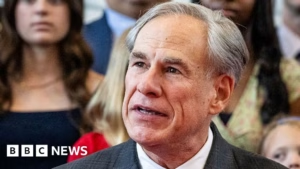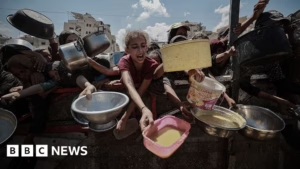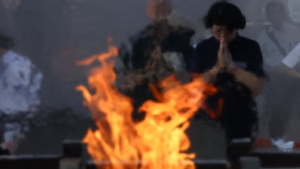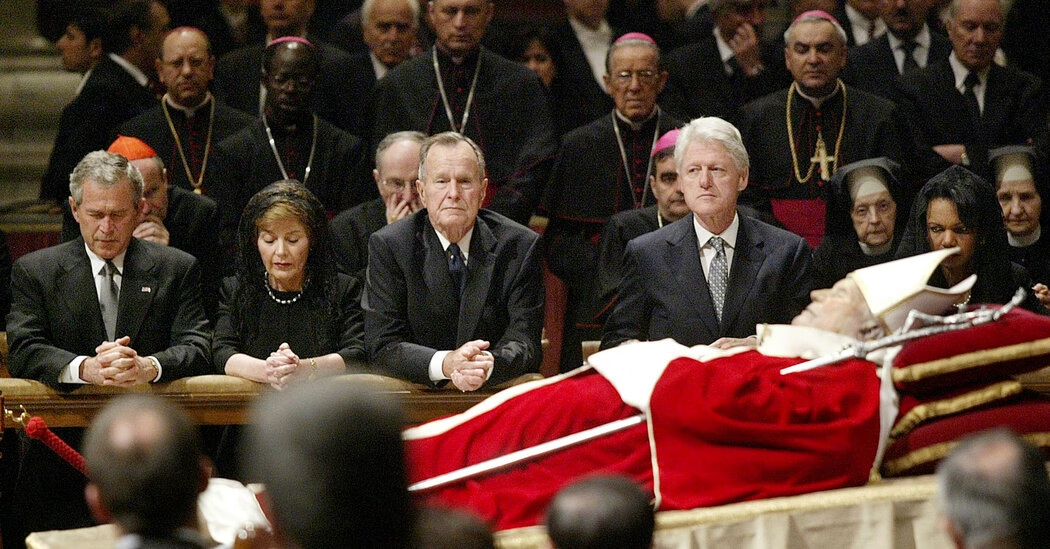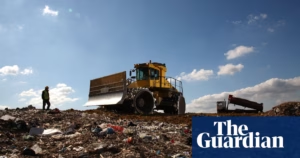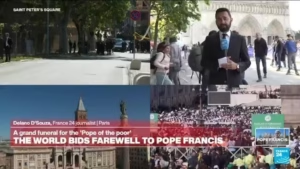Pope Francis, born Jorge Mario Bergoglio, had a humble upbringing in Buenos Aires and grew up to become the first Jesuit pontiff and the first from Latin America. Over the course of his 12 years as the leader of the Roman Catholic Church, Francis consistently advocated for migrants, the disenfranchised, and urged the church to confront its history of scandal. He promoted an inclusive church, which was well-received by supporters and many Catholics. However, some conservatives resisted his divergence from traditional teachings.
Francis was born on December 17, 1936, in Buenos Aires to Italian immigrant parents and was the eldest of five siblings. He was a religious and intelligent boy who loved dancing the tango. He felt a divine calling to become a priest when he was 16 after experiencing a profound moment in the Basilica of St. Joseph in Buenos Aires.
After 13 years of study and ordination in 1969, Francis led the Jesuits in Argentina during a time of political turmoil, known as the “dirty war.” Despite accusations of not protecting two priests with antigovernment views who were kidnapped and tortured by the regime, Francis vehemently denied these allegations and claimed to have protected priests and others through behind-the-scenes diplomacy.
In 1979, Francis’s tenure as the head of the Jesuits ended due to accusations of having an autocratic management style. He was sent into exile, first to Frankfurt, Germany, and then to Córdoba, Argentina. In 1992, he was unexpectedly named an auxiliary bishop of the Buenos Aires diocese and became archbishop six years later, focusing on outreach to the poor, and was elevated to cardinal in 2001.
In 2013, Francis was elected as the first Latin American pope after Pope Benedict XVI’s resignation. He attempted to shift the church’s focus away from contentious issues like abortion and homosexuality, and onto climate change, poverty, and migration. His first papal trip was to Lampedusa, an Italian island known for receiving asylum seekers and migrants.
In his efforts to address the church’s clerical sexual-abuse scandals, Francis established a commission in 2014. However, the commission, which included victims of abuse and aimed to hold bishops accountable for scandals, ultimately dissolved.
In 2014, he played a crucial role in restoring diplomatic relations between the United States and Cuba. He helped bridge the divide between President Barack Obama and President Raúl Castro of Cuba, leading to a historic agreement.
In 2015, he issued “Laudato Si,” the first papal encyclical focused solely on the environment, emphasizing the need to protect the environment and criticizing the excesses of global capitalism in exploiting the poor. He also addressed the U.S. Congress, becoming the first pope to do so, and promoted environmental conservation and action against climate change.
In 2016, a spat erupted between Francis and Donald J. Trump, the Republican nominee for President, where Francis questioned Mr. Trump’s faith due to his preference for building walls instead of bridges.
In 2017, Francis visited Egypt to promote closer relations with other religions, where he denounced “demagogic forms of populism” and religious violence.
In 2018, he reached a provisional agreement with the Chinese government to end a long-standing power struggle over the right to appoint bishops in China. This allowed the church greater access to China, but it also led to the legitimization of seven bishops appointed by Beijing, which critics believed set a dangerous precedent.
In 2019, Francis issued the church’s most comprehensive response to the sexual abuse crisis by obligating church officials worldwide to report cases of abuse and cover-ups. However, the omission to require reporting abuse to the police enraged victims.
During the same year, a meeting of bishops from the Amazon region suggested that Francis allow the ordination of married men as priests in remote areas of South America, but he ultimately set aside the proposal.
The COVID-19 pandemic saw Francis deliver a blessing and called for global solidarity on Good Friday in 2020. The address was symbolic given Italy’s lockdown at the time.
In 2022, Francis begged for forgiveness from Canada’s Indigenous people for the “evil” inflicted upon them by Christians during his visit to Canada. He apologized for the church’s role in running residential schools where Indigenous children suffered abuse and many died.
In 2023, Francis made an effort to include women by holding a meeting of world bishops that included women and lay people as voting members. The meeting, known as a synod, did not change church policies but Francis allowed priests to bless gay couples.
Pope Francis passed away on Monday less than 24 hours after blessing the faithful gathered for Easter Mass in St. Peter’s Square. He appeared frail and unable to address the crowd, which instead was addressed by a Vatican aide.
Francis’s failing health had been a concern in the preceding months as he dealt with a serious respiratory infection that had sent him to the hospital for several weeks.
Francis leaves a legacy of inclusion, activism, and promotion of the causes of migrants, the marginalized, and environmental conservation. Ali Watkins contributed reporting.
Source: https://www.nytimes.com/live/2025/04/26/world/pope-francis-funeral/twenty-years-ago-three-us-presidents-traveled-together-to-mourn-a-pope-not-so-this-time
